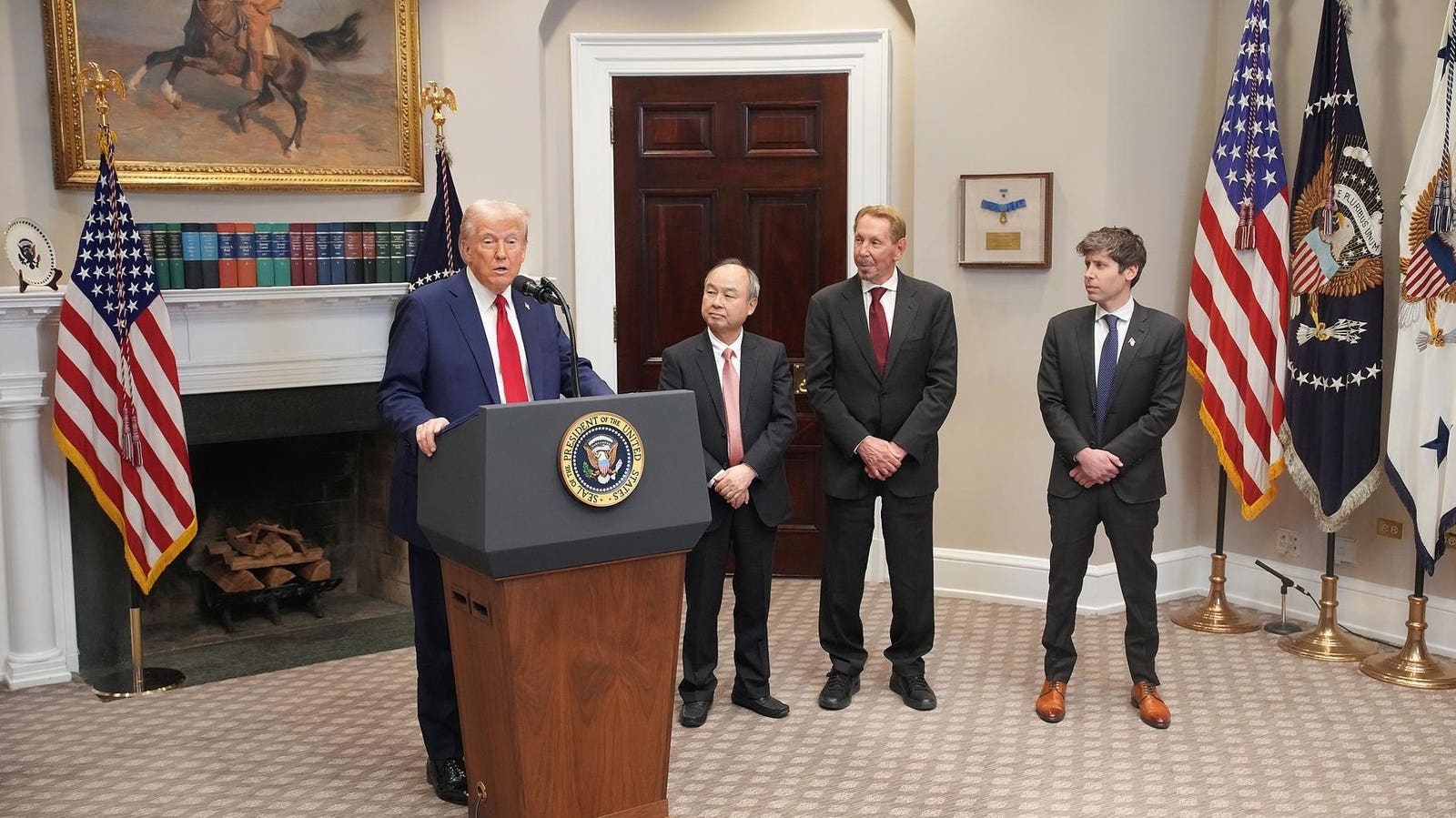Big Bets, Bigger Rivalries: The Race For AI Leadership
Share to FacebookShare to TwitterShare to LinkedinWASHINGTON, DC – JANUARY 21: U.S. President Donald Trump speaks in the Roosevelt Room of the White … [+] House while SoftBank CEO Masayoshi Son, Oracle co-founder, CTO and Executive Chairman Larry Ellison, and OpenAI CEO Sam Altman look on on January 21, 2025 in Washington, DC. Trump is expected to announce investment in artificial intelligence (AI) infrastructure. (Photo by Andrew Harnik/Getty Images)
Getty Images The surprising announcements of the Stargate joint venture and the Chinese AI start-up DeepSeek in the past two weeks have created a frenzy of confusion in the tech industry, resulting some of the biggest swings in the history of the stock market.
While the U.S. was high-fiving the radical idea of investing $500 billion for Stargate AI datacenters, the initiative took a media backseat as DeepSeek released a more innovative technical approach to AI. As Angela Zhang said in the Financial Times, “China’s achievements in efficiency are no accident. They directly respond to the escalating export restrictions imposed by the US and its allies. By limiting China’s access to advanced AI chips, the U.S. has inadvertently spurred its innovation.”
In an era when artificial intelligence and data reign as catalysts for technological progress, President Trump introduced the Stargate joint venture project as an audacious initiative to secure America’s leadership on the global stage. It is serving that purpose, but the DeepSeek announcement left the Stargate team grasping for relevancy.
Just a few days after the White House announced Stargate, DeepSeek’s AI assistant further disrupted the AI world by leveraging a radically optimized training approach with a (reportedly) dramatic decrease in required resources. The DeepSeek strategy not only accelerates model training but also resulted in a leaner architecture that rivaled—and in certain tasks, surpassed—competitors’ performance. Despite having fewer financial resources than established players, DeepSeek’s rapid model evolution allowed it to outmaneuver much more mature large language model companies and capture significant market attention.
Despite the whirlwind caused by DeepSeek’s rapid success, Stargate remains highly relevant to America’s future in AI. First and foremost, the sheer scale of Stargate’s $500 billion initiative provides a solid foundation for long-term R&D and implementation of advanced AI systems—far beyond what a single private venture could ever accomplish alone. By pooling resources among tech giants and innovative startups, Stargate unites unite a vast network of expertise under one strategic vision. This approach not only drives the creation of next-generation AI models, but also ensures that the innovations are distributed across diverse sectors, from defense and healthcare to energy and finance.
MORE FOR YOUTrump Tariffs Live Updates: Beijing Criticizes ‘Politicization’ Of Chinese Companies After USPS Halts Incoming Packages From ChinaUSAID Controversy Live Updates: Nearly All Of USAID’s 10,000 Global Staffers To Be Placed On LeaveUSPS Halts All Inbound Packages From China And Hong Kong—Here’s Why It Could Affect Temu And Shein Orders On the other hand, DeepSeek may well prove beneficial to American innovation in ways that aren’t completely clear today. Its lean approach serves as both a challenge and an example for U.S. domestic players. Competition motivates the tech ecosystem to identify and refine inefficiencies by finding novel data-centric approaches to model development, such as the more robust use of synthetic data.
Finally, despite questions about how this scrappy Chinese startup was able to do what U.S. big tech companies have done at a fraction of the cost, DeepSeek’s emergence as a serious global competitor is galvanizing U.S. public opinion and government support for deeper investment in AI research, education, and security. This heightened attention could translate into new funding sources and incentives for private companies to collaborate with government research agencies. In a sense, DeepSeek’s success could ignite a sense of urgency—similar to past races for industrial supremacy—and spur action that cements America’s status as the world’s AI superpower.
While new information about Stargate and DeepSeek is emerging every day, here are three things to keep in mind:
Scale Matters
Thanks to its broad coalition of participants, Stargate can foster cross-industry synergy and enable extensive parallel experimentation, allowing multiple approaches to the same problem. The massive compute capacity of parallel GPU-powered datacenters will allow scientists and engineers to tackle AI problems that might be too risky or costly for smaller players or startups.
Exploiting Resource Constraints
There has been a lot of focus on how export restrictions forced DeepSeek to become more efficient, but a deeper economic insight is that resource constraints can act as a catalyst for innovation. Novel techniques can emerge, potentially disrupting global market structures when well-funded incumbents are blindsided by newcomers who excel at doing more with less. Sanctions and export controls can be a double-edged sword, leading to unintended consequences.
National Security
While recent reporting highlights the commercial race between Stargate and DeepSeek, there’s a critical security dimension that deserves attention. DeepSeek’s rapid advancement raises questions about the verifiability of AI models developed under different regulatory regimes. The implications for international AI governance and security go beyond the recurring “AI arms race” discussion and will influence how nations approach both collaboration and competition in AI.
In the grander scheme of things, Stargate and DeepSeek aren’t necessarily mutually exclusive. That is, one’s success doesn’t inherently diminish the other’s value. DeepSeek’s unexpected success can also be the impetus for Stargate to find new efficiencies, resulting in a more dynamic AI landscape,
In 2017 Russian President Vladimir Putin said, “Artificial intelligence is the future, not only for Russia, but for all humankind,” and, “whoever becomes the leader in this sphere will become the ruler of the world.” AI will ultimately have a role in redefining world order and as of now, the race is on.
Follow me on Twitter or LinkedIn.











 Bitcoin
Bitcoin  Ethereum
Ethereum  Tether
Tether  XRP
XRP  USDC
USDC  Solana
Solana  TRON
TRON  Figure Heloc
Figure Heloc  Lido Staked Ether
Lido Staked Ether